

Information Literacy for Littlies. From the time they are born children are innately curious and as soon as they are able to articulate the words, they ask questions so they can make the connections they need as they try to make sense of their world.
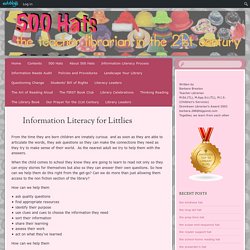
As the nearest adult we try to help them with the answers. When the child comes to school they know they are going to learn to read not only so they can enjoy stories for themselves but also so they can answer their own questions. Extreme05. Enter into the Research. A MiddleWeb Blog “Do you always do this research project?”
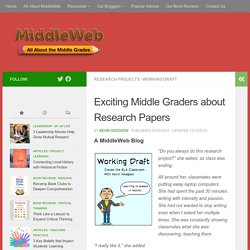
She asked, as class was ending. All around her, classmates were putting away laptop computers. She had spent the past 30 minutes writing with intensity and passion. She had not wanted to stop writing even when I asked her multiple times. “I really like it,” she added. “Some years, we do political essays,” I responded. Then, as a typical sixth grader, she said it anyway. I wish every conversation with my sixth grade students about classroom research projects were this positive. A memory that gives me shivers Kevin, behind his 6th grade teacher I still remember a monumental, and nearly insurmountable, research project that I was assigned in elementary school on an African country. I don’t even remember the country I researched nor do I recall what I discovered in my inquiry. Conducting Effective Internet Research.
There has been a great deal of buzz about research-based writing lately, in no small part because of its emphasis in the Common Core Standards.
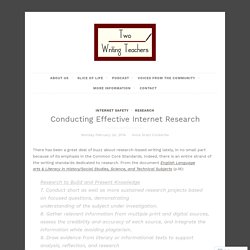
Indeed, there is an entire strand of the writing standards dedicated to research. From the document English Language arts & Literacy in History/Social Studies, Science, and Technical Subjects (p.18): Research to Build and Present Knowledge 7. Conduct short as well as more sustained research projects based on focused questions, demonstrating understanding of the subject under investigation. 8. Gather relevant information from multiple print and digital sources, assess the credibility and accuracy of each source, and integrate the information while avoiding plagiarism. 9. Research-based writing is quite challenging in that it requires complex reading skills. There is, of course, one HUGE thing that has changed about research-based writing: the Internet.
Bookmark appropriate search engines. Your Turn Like this: Like Loading... Building Good Search Skills: What Students Need to Know. Getty The Internet has made researching subjects deceptively effortless for students — or so it may seem to them at first.
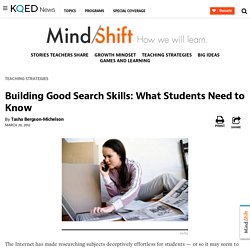
Truth is, students who haven’t been taught the skills to conduct good research will invariably come up short. That’s part of the argument made by Wheaton College Professor Alan Jacobs in The Atlantic, who says the ease of search and user interface of fee-based databases have failed to keep up with those of free search engines. In combination with the well-documented gaps in students’ search skills, he suggests that this creates a perfect storm for the abandonment of scholarly databases in favor of search engines. He concludes: “Maybe our greater emphasis shouldn’t be on training users to work with bad search tools, but to improve the search tools.”
His article is responding to a larger, ongoing conversation about whether the ubiquity of Web search is good or bad for serious research. So what are the hallmarks of a good online search education? ANTHILL nmemonic for research process. Common Core in Action: 10 Visual Literacy Strategies. Do you wish your students could better understand and critique the images that saturate their waking life?
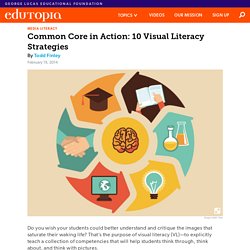
That's the purpose of visual literacy (VL), to explicitly teach a collection of competencies that will help students think through, think about and think with pictures. Standards Support Visual Literacy Instruction Visual literacy is a staple of 21st century skills, which state that learners must "demonstrate the ability to interpret, recognize, appreciate and understand information presented through visible actions, objects and symbols, natural or man-made.
" Putting aside the imperative to teach students how to create meaningful images, the ability to read images is reflected in the following standards. Common Core State Standards (CCSS) CCSS.ELA-Literacy.RH.6-8.7: "Integrate visual information (e.g., in charts, graphs, photographs, videos or maps) with other information in print and digital texts. " Research Process Livebinder USC-SLIS 742. Icts-sc / The Simple Four. The Simple Four is a problem-solving research model developed for South Carolina and works with the research and inquiry standard (Standard 6) in the 2007 ELA Academic Standards.
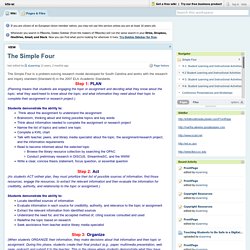
Step 1: PLAN (Planning means that students are engaging the topic or assignment and deciding what they know about the topic; what they want/need to know about the topic; and what information they need about their topic to complete their assignment or research project.) Students demonstrate the ability to: